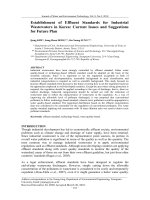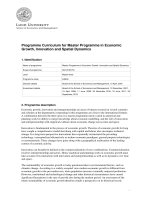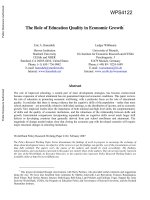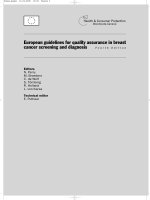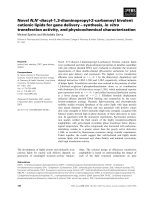Programme Curriculum for Master Programme in Economic Growth, Innovation and Spatial Dynamics docx
Bạn đang xem bản rút gọn của tài liệu. Xem và tải ngay bản đầy đủ của tài liệu tại đây (78.14 KB, 10 trang )
1
Programme Curriculum for Master Programme in Economic
Growth, Innovation and Spatial Dynamics
1. Identification
Name of programme
Master Programme in Economic Growth, Innovation and Spatial Dynamics
Scope of programme
60/120 ECTS
Level
Master level
Programme code
EAEGI
Decision details
Board of the School of Economics and Management, 13 April, 2007
Amendment details Board of the School of Economics and Management, 19 December, 2007,
10 April, 2008, 11 June, 2009, 30 November 2010, 16 June, 2011
, 24
September, 2012
2. Programme description
Economic growth, innovation and entrepreneurship are areas of intense research in several countries
and scholars at the departments cooperating in this programme are close to the international frontier.
A combination between the three areas in a master programme meets a need in analytical and
planning work for ability to merge knowledge about economic modelling, and the role of innovation
and entrepreneurship with empirical evidence about economic change across time and space.
Innovation is fundamental in the process of economic growth. Theories of economic growth for long
have sought a comprehensive model that along with capital and labour also encompass technical
change. In a long-term perspective innovations have repeatedly restructured the prevailing
technology, conceptualized alternatively as techno-economic paradigms, general purpose technologies
or synonymously. These changes have gone along with a geographical reallocation of the leading
centres of economic activity.
Innovation can broadly be defined as the commercialization of new combinations. Commercialization
involves entrepreneurship and actors. Hence analytical and planning work on economic growth must
take account of its interaction with innovation and entrepreneurship as well as its dynamics over time
and space.
The sustainability of economic growth is today questioned due to environmental factors, such as
climatic change. According to a widely accepted view modern economic growth is different from
economic growth in the pre-modern era, when population increase eventually outpaced production.
However, institutional and technological change and other historical circumstances have caused
significant fluctuations in the rate of growth also during the modern period. An assessment of the
future sustainability of economic growth therefore entails a perspective on its historical record.
Lund University, School of Economics and Management EAEGI
2
The aim of the master programme is to provide knowledge about theories of economic growth and
innovation; insights in the historical evidence of economic growth and innovation; insights in the
spatial dimensions of economic growth and innovation; insights in the entrepreneurial activity and
commercialisation of innovations. Further, the aim is to make sure that students acquire the ability
critically to assess reports and scientific literature related to economic growth and innovation as well
as the ability to carry out investigations and analyses concerning economic growth and innovation.
Career opportunities
As a master of Economic Growth, Innovation and Spatial Dynamics you will qualify for any
profession that requires capability of intellectual judgement, evaluation and analysis of economic
facts and ideas, and good communication skills. Graduates of this programme are particularly
equipped for analytical and planning work in government and international organisations as well as
non-government organisations and consultancy.
Connection to further studies
Successful completion of the programme will enable students whom chooses to specialise in
economic history to apply to doctoral programmes in economic history, and student whom chooses to
specialise in social and economic history to apply to doctoral programmes in social and economic
geography.
3. Learning outcomes
The programme builds on previous studies at the undergraduate level in social sciences. In accordance
with the Higher Education Ordinance, a Master of Science (120 credits) is awarded to students who at
the completion of the programme accomplish the following:
Knowledge and understanding
- demonstrate knowledge and understanding in the field of Economic Growth, Innovation and Spatial
Dynamics, including both broad knowledge in the field and substantially deeper knowledge of certain
parts of the field, together with deeper insight into current research and development work; and
- demonstrate deeper methodological knowledge in the field of Economic Growth, Innovation and
Spatial Dynamics.
- demonstrate a comprehensive knowledge of theories of growth and innovation
- be trained to understand the process of economic growth and the structures underlying it. In
particular, this concerns the role of innovations and how different social, economic and spatial
contexts influence processes of innovation and entrepreneurship.
Skills and abilities
- demonstrate an ability to critically and systematically integrate knowledge and to analyse, assess and
deal with complex phenomena, issues and situations, even when limited information is available;
- demonstrate an ability to critically, independently and creatively identify and formulate issues and to
plan and, using appropriate methods, carry out advanced tasks within specified time limits, so as to
contribute to the development of knowledge and to evaluate this work;
- demonstrate an ability to clearly present and discuss their conclusions and the knowledge and
arguments behind them, in dialogue with different groups, orally and in writing, in national and
international contexts; and
- demonstrate the skill required to participate in research and development work or to work
independently in other advanced contexts.
- demonstrate an ability to work individually as well as in groups with students from different cultures
in order to solve practical problems as well as to manage a more extensive project.
Lund University, School of Economics and Management EAEGI
3
- be trained to communicate their own and others results, both in writing and orally. Emphasis will be
put on the ability to present results clearly, both to specialists and non-specialists in the field.
Judgement and approach
- demonstrate an ability to make assessments in the field of Economic Growth, Innovation and Spatial
Dynamics, taking into account relevant scientific, social and ethical aspects, and demonstrate an
awareness of ethical aspects of research and development work;
- demonstrate insight into the potential and limitations of science, its role in society and people’s
responsibility for how it is used; and
- demonstrate an ability to identify their need of further knowledge and to take responsibility for
developing their knowledge.
- be able to independently read, interpret and assess current research in growth and innovation as well
as advanced professional reports and analyses.
Independent project (degree project)
For a Master of Science (120 credits) students must have completed an independent project (degree
project) worth at least 30 higher education credits in the field of Economic Growth, Innovation and
Spatial Dynamics, within the framework of the course requirements. The independent project may
comprise less than 30 higher education credits, but not less than 15 higher education credits, if the
student has already completed an independent project at the second level worth at least 15 higher
education credits in their main field of study.
Students have the possibility to leave the programme after one year and in accordance with the Higher
Education Ordinance obtain a Master of Science (60 credits). The degree is awarded to students who
at the completion of the programme accomplish the following:
Knowledge and understanding
- demonstrate knowledge and understanding within the field of Economic Growth, Innovation and
Spatial Dynamics, including both a broad command of the field and deeper knowledge of certain parts
of the field, together with insight into current research and development work; and
– demonstrate deeper methodological knowledge in the field of Economic Growth, Innovation and
Spatial Dynamics
- be trained to understand the process of economic growth and the structures underlying it. In
particular, this concerns the role of innovations and how different social, economic and spatial
contexts influence processes of innovation and entrepreneurship.
Skills and abilities
- demonstrate an ability to integrate knowledge and to analyse, assess and deal with complex
phenomena, issues and situations, even when limited information is available;
- demonstrate an ability to independently identify and formulate issues and to plan and, using
appropriate methods, carry out advanced tasks within specified time limits;
- demonstrate an ability to clearly present and discuss their conclusions and the knowledge and
arguments behind them, in dialogue with different groups, orally and in writing; and
- demonstrate the skill required to participate in research and development work or to work in other
advanced contexts.
- demonstrate an ability to work individually as well as in groups with students from different cultures
in order to solve practical problems as well as to manage a more extensive project.
- be trained to communicate their own and others results, both in writing and orally. Emphasis will be
put on the ability to present results clearly, both to specialists and non-specialists in the field.
Lund University, School of Economics and Management EAEGI
4
Judgement and approach
- demonstrate an ability to make assessments in the field of Economic Growth, Innovation and Spatial
Dynamics, taking into account relevant scientific, social and ethical aspects, and demonstrate an
awareness of ethical aspects of research and development work;
- demonstrate insight into the potential and limitations of science, its role in society and people’s
responsibility for how it is used; and
- demonstrate an ability to identify their need of further knowledge and to take responsibility for
developing their knowledge.
Independent project (degree project)
For a Master of Science (60 credits) students must have completed an independent project (degree
project) worth at least 15 higher education credits in Economic Growth, Innovation and Spatial
Dynamics, within the framework of the course requirements.
4. Course information
The program has the following structure:
The preceding paragraphs outline the main themes of the master programme Economic Growth,
Innovation and Spatial Dynamics. The themes are clearly of primary relevance for the 21st century
and a master in Economic Growth, Innovation, and Spatial Dynamics will be well prepared for
pursuing analytical work and investigations in private as well as public governance and publishing.
Properly completing two years study at the programme will give the student a master's degree.
However, the student can also choose to complete only the first year of the programme and receive a
one-year master’s degree. The programme starts with the autumn semester every year.
The programme is provided by the departments of Business Administration, Economic History, and
Human Geography. Besides taking the courses given jointly by professors from the three departments,
students have to take optional courses given by the participating departments. A list of optional
courses is presented below.
During the final part of the spring semester the student carries out an independent research task and
writes a paper. The subject of the paper conforms to the chosen alternative of the programme, and the
student's supervisor is affiliated with the corresponding department. The three cooperating
departments pursue high quality research in areas closely related to the programme and are well
equipped for the supervision of students' thesis work.
In addition to the programme, the core courses and the paper writing, the student also has to take
optional courses. At the School of Economics and Management optional courses will be offered but
these can also be taken at other faculties of Lund University or at another university. However, the
optional courses should be of relevance for the programme and guidelines for the choice of optional
courses will be supplied.
The table gives an overview of the possible structure of the programme. All courses encompass 7.5
ECTS, and are taught at part-time during half a semester. Normally the student thus studies two
courses in parallel.
Lund University, School of Economics and Management EAEGI
5
Semester 1 (Autumn), year 1
Semester 2 (Spring), year 1
Period 1
Sept-Oct
Period 2
Nov-Dec
Period 3
Jan-March
Period 4
April-May
EKHM22 Economic growth
over time and space 7.5
ECTS (programme)
EKHM32 Economics of
innovation 7.5 ECTS
(programme)
Optional course 7.5 ECTS
Paper and/or degree
project 15 ECTS
Optional course 7.5 ECTS
Optional course 7.5 ECTS
Optional course 7.5 ECTS
Semester 1 (Autumn), year 2
Semester 2 (Spring), year 2
Period 1
Sept-Oct
Period 2
Nov-Dec
Period 3
Jan-March
Period 4
April-May
EKHM23 Small Business
Economics, Regional
Development, and
Entrepreneurship 7.5
ECTS (programme)
EKHM33 Innovation,
Energy and Sustainability
7,5 ECTS
(programme)
Optional course 7.5 ECTS
Degree project 15 ECTS
EKHM25 Econometrics
7.5 ECTS
Optional course 7.5 ECTS Optional course 7.5 ECTS
Joint courses
EKHM22 Economic Growth over Time and Space (7.5 ECTS)
Innovation and technical change is central to long-term economic growth but it is treated very
differently in economic theories. In a comparative manner this course presents technical change
within major theoretical approaches: neoclassical growth models, endogenous growth models and
evolutionary structural models. Particular attention is given to an economic historical model
combined with a spatial theoretical framework of regional trajectories of growth. The model is based
upon complementarities around innovations forming development blocks that are driving processes of
structural change. Thus, the interplay between innovations, economic transformation and economic
growth is studied with an emphasis on major carrier branches both historically and in contemporary
times. Innovations are analysed in relation to variations over time in, e.g., relative prices,
entrepreneurial activity, investments, labour demand and employment. It is shown how this, at an
aggregate level, shows up in phases of spatial convergence and divergence, respectively.
Furthermore, factors governing the diffusion of innovations - including the interplay between
economic and institutional change - are studied. In this context the economics of spatial clustering and
localised externalities is central. A related aspect is how clusters and regions contribute to the
characteristics of national technological shifts and economic growth.
EKHM32 Economics of innovation (7.5 ECTS)
How innovations occur is the issue of this course. Which are the social, institutional and economic
conditions that foster their emergence? Which is the role of economic incentives and of culture for the
ability and propensity of individuals to engage in innovation?
Lund University, School of Economics and Management EAEGI
6
The estimation of innovation raises several problems of measurement and about the use of typology.
A basic distinction is made between innovations that come up with something entirely new, such as
radical or horizontal innovations, and innovations that improve something already in use, labelled
incremental or vertical innovations. Different methodologies are used for the collection of data on
innovations. Sometimes proxies or substitute measures, such as patents and investments in research
and development (R&D), are used. The meaning and properties of these methodological problems are
examined.
The course also studies certain aspects of innovations, for example: their distribution on small,
middle-sized, and big firms as well as on firms of different ages and sectors; the classification of their
origin, the type of knowledge needed for their realization, the time needed for their development, the
character and extent of collaboration they need, the character and amount of public support provided.
Some of these aspects are typically related to national innovation systems (NIS), a concept for
comparative analysis of innovative performance.
[flyttas till Optional]
EKHM23 Small Business Economics, Regional Development, and Entrepreneurship (7.5 ECTS)
Entrepreneurial activity is basically about finding innovations and managing their commercialisation.
This is a highly organized activity within the modern large-scale enterprise, carried out by research
laboratories, development sections and so forth. However, the individual entrepreneur and small-scale
business firm often have a particularly dynamic role in innovation. Today, it is widely accepted that
entrepreneurship and small businesses contribute to societal development and economic growth. One
part of the course focuses on macro level aspects such as patterns of the sectoral distribution of small
businesses and the role of financial systems for their emergence and performance. Another
concentrates on the micro level with case studies. The key elements of the entrepreneurial process are
studied, such as the recognition of business opportunities, and the mobilization of resources in order
to exploit opportunities on a market. The relation between innovations and entrepreneurial activity is
studied both over time and in a regional context.
EKH25 Econometrics (7.5 ECTS)
This course provides the student with a fundamental understanding of the theoretical and
methodological problems associated with quantitative approaches to economic history.
The first part
of the course consists of theory and methods relating to multivariate linear regression,
limited dependent variable regression and basics of time series analysis. It also considers
how to apply these methods, with examples of how such methods are used in economic
demography and economic history. This part also introduces computer software (STATA
or comparable) for quantitative analysis. In the second part of the course, students
analyze a quantitative problem using actual data from economic demography or
economic history, and report results in individual papers.
EKHM33 Innovation, Energy and Sustainability (7.5 ECTS)
Modern economic growth has been sustained over two centuries but will it remain sustainable?
Environmental problems, in particular climate change, may cause backlash with severe consequences
for human civilization. With the widening of modern economic growth to low-income countries, such
as China and India, this dismal outlook seems substantiated. However, according to one theory,
transformation of industrial economies to service economies reduces the exploitation of natural
resources and environmental damage. Other theories have confidence in technological change that, for
example, will develop renewable and sustainable energy sources. This course puts these and related
theories into the perspective of the long-term evidence. Particular emphasis is laid on the present state
of the arts as regards the economics of energy technology as well as the institutional incentives and
constraints for innovation in this field.
Lund University, School of Economics and Management EAEGI
7
Optional courses
Below are listed those optional courses that primarily can be included in the degree from this
programme. The timing of the optional courses differs somewhat from year to year and the details are
laid out at the introductory week of the programme. Some of the courses may, due to timing and size,
be less compatible with the programme schedule. However, solutions can be found and the student is
therefore recommended to discuss the choice of optional courses with the programme director. There
are also other courses that can be accepted as optional courses on request by the student.
Business Administration
Optional courses provided by the Department of Business Administration:
BUSN41 Organizational Development (7.5 ECTS)
This course provides knowledge about how and why organisations change. It deals in particular with
techniques for intervention in organisations used by managers and consultants. Studied are both
descriptive approaches for the understanding of change and development, as well as more normative
problems considering the information of those concerned by organizational change. The course is
given during the second part of the autumn semester.
ENTN04 Managing New Venture Growth (7.5 ECTS)
This course provides knowledge about why some new ventures grow. Besides the entrepreneurial
activity it also studies government policies for venture growth. Key concepts are introduced, such as
growth barriers, organizational inertia, growth strategies, capabilities and resources, corporate
governance and competitive advantage. Resource-based theory, life-cycle theories and motivational
theories are used. The course is given during the first part of the spring semester.
Economic History
Optional courses provided by the Department of Economic History:
EKHM20 Comparative analysis of economic change (7.5 ECTS)
This course introduces major themes in economic history and how these have been approached in
research. Explorative methodologies versus hypothesis testing are discussed. It is studied how data are
obtained, analysed and interpreted by researchers. Basic concepts of quantitative analysis are
introduced and applied in exercises. The course is given during first half of the autumn semester and
is recommended for first-year students.
EKHM43 The global economy and long-term economic growth (7.5 ECTS)
This course studies historical processes of growth, convergence and divergence in the global economy
over the past two centuries. Two different approaches are applied. One considers theories of economic
growth, about how production is generated by capital and labour and the level of technology. The
other takes the perspective of the international economy and studies international trade, migration,
and movements of capital. The course is given during the first half of spring semester and is
recommended for first-year students.
EKHM42 Institutions, economic growth, and equity (7.5 ECTS)
This course studies the relations between institutions, modern economic growth, and equality.
Problems in the world of today are taken as a point of departure for an historical analysis that covers
countries and regions in different parts of the world. Four themes are focussed. One is about the
emergence of institutions such as property rights and markets, and their role for economic growth.
The second is about the importance of the distribution of resources for institutional development. The
third is about the importance of the growth of knowledge and education for the creation of equality of
opportunity. The fourth is about the emergence of the modern welfare state as well as current
Lund University, School of Economics and Management EAEGI
8
challenges to its future. The course is given during the first half of spring semester and is
recommended for first or second-year students.
EKHM30 Population and living standards (7.5 ECTS)
This course deals with the interplay between population and living standards in a long-term
perspective. It focuses on three broader themes. In the first, different models of the preindustrial
economic demographic system are studied, and the legacy of these models (e.g. Malthusianism) and
their relevance today is assessed. Different demographic indicators of living standards, such as life
expectancy, infant mortality and demographic responses to economic fluctuations, are discussed and
compared with other well-being indicators in an assessment of the long-term global development of
standard of living. The second theme deals with the importance of population dynamics, especially
fluctuations in fertility, and thus cohort size, on living standards in industrial society. The third theme
focuses on the role of families and households in providing welfare and security of its members. Both
the development over time and global comparisons are central in this theme. The course is given
during the second half of autumn semester and is recommended for first or second-year students.
EKHM40 Research Design (7.5 ECTS)
This course offers training for students to find and evaluate data. It will be directed towards different
areas dependent on the field of specialization. The course is given during the first half of spring
semester and will prepare students for the thesis writing.
Human Geography
Optional courses provided by the Department of Human Geography:
SGEM13 Human Geography: Social, Economic and Environmental Challenges for Cities,
Landscapes and Regions (15 ECTS)
The course is synthetic and contextual in character and aims to meet rising demand in both private
and public sectors for strategic and advanced knowledge about increasingly complex milieus. The
course focuses on some of the most important societal challenges that today’s cities and surrounding
landscapes face, and potential ways to tackle these through policies and planning.
SGEM32 Geographical Information Systems: Advanced applications (15 ECTS)
This course is designed to equip students with a range of advanced knowledge and skills needed to
complete a substantive piece of independent, social scientific research in GIS. It will cover key
conceptual debates and developments in GIS. The course aims to provide an extensive awareness of
theories and practises of GIS. The course will build up a high level of practical skills and experience
in the use of high quality hardware and software tools for input, analysis, management, and
visualization of geographic information. It will develop a range of transferable skills, with special
emphasis on spatial analysis.
SGEM31 Geographical Information Systems (GIS): Interdisciplinary applications (15 ECTS)
This course will introduce students to some key conceptual debates and developments in GIS. The
course aims to provide an introduction to some of the most important theories and practises of GIS.
During the course the students will become aware of the potential uses of GIS, as well as its
application within various fields of study. An introduction to the principles of GIS as well as the main
state-of-the-art issues will be covered in the theoretical lectures. In combination with the lectures, a
series of practical workshop sessions and laboratory work will introduce students to the leading GIS
software packages available.
Lund University, School of Economics and Management EAEGI
9
5. Degree
Upon completion of the programme a Master of Science (120 credits) major Economic Growth,
Innovation and Spatial Dynamics (filosofie masterexamen, huvudområde: ekonomisk tillväxt,
innovation och spatial dynamik) will be awarded in compliance with the National Higher Education
Ordinance (SFS 2006:1053).
Students can also decide to finish after the first year with a Master of Science (60 credtits) with a
major in Economic Growth, Innovation and Spatial Dynamics (filosofie magisterexamen,
huvudområde: ekonomisk tillväxt, innovation och spatial dynamik).
6. Admission requirements and selection criteria
a)
An undergraduate degree (BA/BSc) of at least 3 years, 180 ECTS credits, including at least 60
ECTS credits in either business administration, economics, economic history, history, social and
economic geography, statistics, or the equivalent knowledge.
b) A good command of English language both spoken and written, equivalent to English course B
(advanced level) in the Swedish secondary system. Equivalence assessments will be made
according to national guidelines.
The regulations in the general requirements concerning knowledge of the Swedish language are not
applicable for international applicants.
Selection criteria
Selection will be based on academic merits from university studies and a Statement of Purpose in
which applicants should state their reasons for applying to the programme.
7. Other information
Courses at the School of Economics and Management are graded according to the criterion-referenced
principal grades A-F:
GRADE
POINTS
CHARACTERISTIC
A
Excellent
100-85
A distinguished result that is excellent with regard to the following
aspects – theoretical depth, practical relevance, analytical ability and
independent thought.
B
Very good
84-75
A very good result with regard to the above mentioned aspects.
C
Good
74-65
The result is of a good standard with regard to the above mentioned
aspects and lives up to expectations.
D Satisfactory 64-55 The result is of a satisfactory standard with regard to the above
mentioned aspects and lives up to expectations.
E
Sufficient
55-50
The result satisfies the minimum requirements with regard to the
above mentioned aspects, but not more.
F Fail 49-0 The result does not meet the minimum requirements with regard to
the above mentioned aspects.
It is up to the teaching professor to decide whether the credits of a course should be converted into a
total of 100 points for each course, or if the scale above should be used as percentage points of any
chosen scale instead.
Lund University, School of Economics and Management EAEGI
10
Disciplinary actions against plagiarism
The University views plagiarism very seriously, and will take disciplinary actions against students for
any kind of attempted malpractice in examinations and assessments. The penalty that may be imposed
for this, and other unfair practice in examinations or assessments, includes suspension from the
University.
